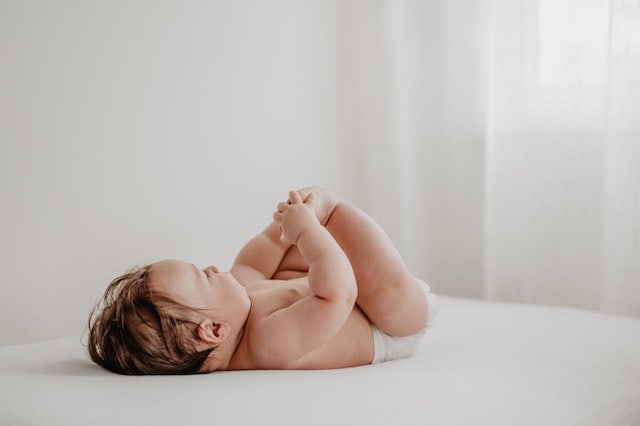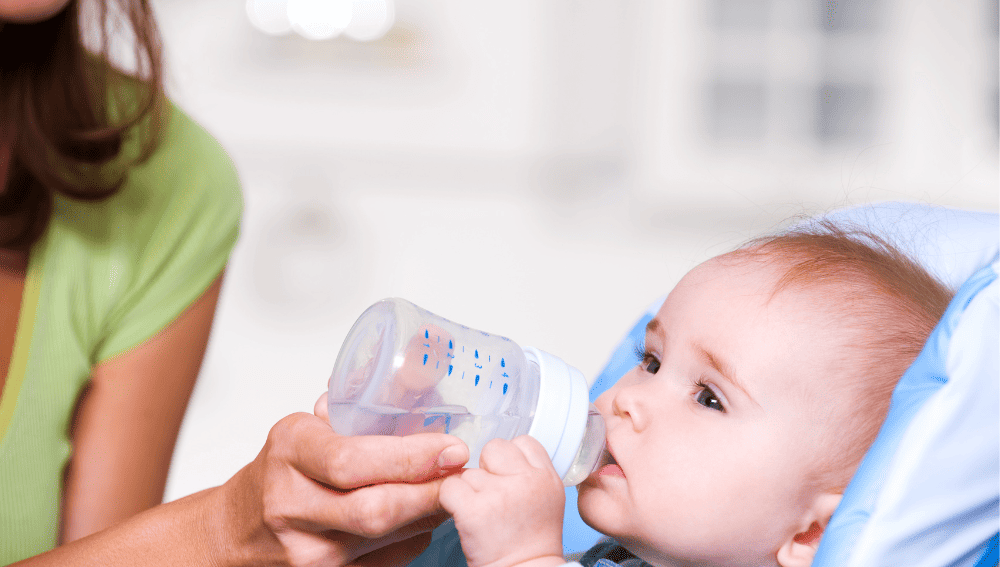When a baby wakes up with a dry diaper, it can be a cause for concern for many parents. Understanding a baby’s diaper patterns and the causes of a dry diaper can help ease worries and ensure proper care.
Typically, babies wet their diapers frequently throughout the day and night, with newborns wetting up to 12 times a day.
A dry diaper in the morning may be a sign that the baby is not getting enough fluids or may be dehydrated. However, it is important to note that every baby is different and may have variations in their diaper patterns.
There are several potential causes for a baby waking up with a dry diaper, including a decrease in fluid intake, sleeping for longer periods of time, or a medical condition such as diabetes insipidus.
Knowing when to seek medical attention is crucial in ensuring the baby’s health and well-being.
Key Takeaways
- Understanding a baby’s diaper patterns can help identify potential issues with hydration and health.
- A dry diaper in the morning may be a sign of dehydration or other medical conditions.
- Knowing when to seek medical attention is important in maintaining a baby’s health and well-being.
Understanding Baby’s Diaper Patterns
Babies have different diapering patterns, and it is essential to understand what is normal and what is not. One of the most common concerns for parents is when a baby wakes up with a dry diaper. Here are some things to keep in mind:
Age Matters
The age of the baby plays a significant role in diaper patterns. Newborns tend to have frequent wet diapers, up to 12 times a day, while older babies may have fewer wet diapers.
As babies grow, their bladder capacity increases, and they can hold urine for more extended periods.
Nighttime Diapering
Nighttime diapering is different from daytime diapering. Babies tend to sleep longer at night, and this means they may have a more prolonged period without a diaper change.
It is normal for babies to wake up with a dry diaper in the morning, but this should not be a cause for concern.
Wet Diapers
Wet diapers are a sign that the baby is getting enough fluids and that their kidneys are functioning correctly. It is essential to monitor the number of wet diapers, especially in the first few weeks of life.
As babies grow, the number of wet diapers may decrease, but they should still have at least four to six wet diapers a day.
Dry Diapers
A dry diaper does not necessarily mean the baby is dehydrated. It could be that the baby has not produced enough urine or that they have a more extended period without a diaper change.
However, if the baby consistently wakes up with a dry diaper, it is advisable to consult a healthcare professional.
In conclusion, understanding baby’s diaper patterns is essential for parents to know what is normal and what is not. Age, nighttime diapering, wet diapers, and dry diapers are all factors to consider. If there are any concerns, it is always best to seek advice from a healthcare professional.
Causes of a Dry Diaper
Dehydration
Dehydration is one of the most common reasons for a baby waking up with a dry diaper. If a baby is not getting enough fluids, their body will try to conserve water by reducing urine output.
Signs of dehydration in a baby include a dry mouth, sunken soft spot, sunken eyes, lethargy, and fussiness. Breastfed babies may not show signs of dehydration as quickly as formula-fed babies, as breast milk contains more water.
Changes in Eating Habits
Changes in a baby’s eating habits can also cause them to wake up with a dry diaper. For example, if a baby is going through a growth spurt and is breastfeeding more frequently, they may not produce as much urine during each feeding.
On the other hand, if a baby is eating less than usual due to illness or other reasons, they may not produce as much urine overall.
Potty Training
If a baby is in the process of potty training, they may wake up with a dry diaper if they are successfully holding their urine throughout the night.
However, it is important to note that if a baby is consistently waking up with a dry diaper and showing signs of dehydration, it may be a cause for concern and medical attention should be sought.
In general, it is recommended that babies have at least 6-8 wet diapers in a 24-hour period. If a baby is consistently waking up with a dry diaper and is not showing signs of dehydration, it may simply be a variation in their normal urinary patterns.
However, if there are concerns about dehydration or a urinary tract infection, it is important to seek medical attention.
When to Seek Medical Attention
If a baby wakes up with a dry diaper, it may be a sign of dehydration. While mild dehydration can often be treated at home, severe dehydration can be a serious medical condition that requires immediate attention.
It is important for parents to know when to seek medical attention for their baby.
If a baby shows signs of dehydration, such as lethargy, a sunken soft spot, sunken eyes, fussiness, dry mouth, or fever, it is important to seek medical attention right away. These signs can indicate that the baby is dehydrated and needs medical treatment.
Pediatricians recommend that parents seek medical attention if their baby has not had a wet diaper in six to eight hours or has not had a bowel movement in 24 hours.
This can be a sign of dehydration or other medical issues, and it is important to have the baby evaluated by a medical professional.
In addition to seeking medical attention, parents can take steps to prevent dehydration in their baby. This includes offering frequent feedings, especially if the baby is breastfeeding, and ensuring that the baby is getting enough fluids.
If the baby is sick or has a fever, it is important to offer extra fluids to prevent dehydration.
Overall, it is important for parents to be aware of the signs of dehydration in their baby and to seek medical attention if necessary. With prompt medical treatment and proper hydration, most babies can recover from dehydration and avoid serious complications.
Maintaining Healthy Diaper Habits
Feeding Schedules
Maintaining a consistent feeding schedule is essential for maintaining healthy diaper habits. For breastfed babies, it is recommended to feed on demand, which means feeding whenever the baby shows signs of hunger.
This can result in anywhere from 8 to 12 feedings in a 24-hour period. For formula-fed babies, it is recommended to feed every 3 to 4 hours or on demand.
It is important for parents to track the baby’s feedings to ensure they are getting enough fluids. Breastfeeding mothers should pay attention to their milk supply to make sure it is sufficient for their baby’s needs.
Diaper Changes
Changing a baby’s diaper frequently is crucial for maintaining healthy diaper habits. Newborns should have a diaper change at least 8 to 12 times a day, while toddlers may only need 6 to 8 changes a day.
It is important to change the diaper as soon as it becomes wet or soiled to prevent diaper rash and other skin irritations.
Parents should also make sure to clean the baby’s diaper area thoroughly during each diaper change. This can be done with wipes or a warm, wet cloth. For newborns, it is recommended to use water and cotton balls or a washcloth instead of wipes.
Sleeping Habits
A baby’s sleeping habits can also affect their diaper habits. Newborns typically sleep for 16 to 17 hours a day, waking up every few hours to eat and have their diaper changed. As they get older, they may start to sleep through the night, but this can vary from baby to baby.
It is important for parents to create a safe and comfortable sleeping environment for their baby. This can include using a firm and flat bed, placing the baby on their back to sleep, and avoiding loose bedding and toys in the crib.
Overall, maintaining healthy diaper habits requires consistent feeding schedules, frequent diaper changes, and attention to sleeping habits. By following these guidelines, parents can ensure their baby stays healthy and comfortable.
Benefits of Proper Hydration
Proper hydration is essential for a baby’s health and well-being. Ensuring that a baby is well-hydrated has many benefits, including:
- Maintaining healthy body temperature
- Improving digestion and preventing constipation
- Helping to regulate blood sugar levels
- Supporting healthy brain function and development
- Boosting the immune system and preventing illness
Babies need a lot of fluids to stay hydrated, especially during the first few months of life. A good way to gauge whether a baby is getting enough fluids is by monitoring the number of wet diapers they have in a 24-hour period. A baby should have at least six to eight wet diapers a day.
If a baby wakes up with a dry diaper, it may be a sign that they are dehydrated. Other signs of dehydration in babies include dry mouth, sunken eyes, lethargy, and decreased urine output. In severe cases, dehydration can lead to fever, seizures, and even coma.
Breastfeeding is an excellent way to ensure that a baby is getting enough fluids. Breast milk is about 88% water, and it contains all the nutrients and fluids a baby needs for the first six months of life.
It is also important for mothers to stay hydrated while breastfeeding to maintain their milk supply.
In addition to breastfeeding, babies can also be given water or formula to help keep them hydrated. It is important to note that babies under six months old should not be given water unless advised by a doctor.
In conclusion, proper hydration is crucial for a baby’s health and well-being. Parents should monitor their baby’s fluid intake and ensure that they are getting enough fluids to stay hydrated. If a baby shows signs of dehydration, it is important to seek medical attention immediately.
Frequently Asked Questions
Can babies go all night without peeing?
It is common for babies to go several hours without urinating, even overnight. However, it is important to ensure that your baby is getting enough fluids throughout the day to prevent dehydration.
What are some reasons a baby might wake up with a dry diaper?
There are several reasons why a baby might wake up with a dry diaper. One possibility is that the baby is not drinking enough fluids during the day, which can lead to dehydration.
Another possibility is that the baby has a medical condition that affects their ability to produce urine.
Is it normal for a baby to not wet their diaper overnight?
Yes, it is normal for babies to not wet their diaper overnight. As babies grow and develop, their bladder capacity increases, which means they can hold more urine for longer periods of time.
However, it is important to ensure that your baby is drinking enough fluids throughout the day to prevent dehydration.
What can I do to prevent my baby from waking up with a dry diaper?
To prevent your baby from waking up with a dry diaper, make sure they are getting enough fluids throughout the day.
Offer breast milk or formula regularly, and encourage your baby to drink water if they are old enough. You can also try changing your baby’s diaper right before bedtime to ensure they are comfortable and dry throughout the night.
When should I be concerned about my baby having a dry diaper?
If your baby consistently wakes up with a dry diaper, it may be a sign that they are not drinking enough fluids during the day. If you are concerned, talk to your pediatrician to rule out any medical conditions that may be affecting your baby’s ability to produce urine.
What are some signs that my baby is dehydrated?
Signs of dehydration in babies include dry mouth and tongue, fewer wet diapers than usual, dark yellow urine, lethargy, and a sunken soft spot on the top of the head. If you suspect your baby may be dehydrated, contact your pediatrician immediately.
Related Post: Baby Cries When Changing Diapers
Related Post: Difference Between Pampers Baby Dry And Cruisers

Iesha is a loving mother of 2 beautiful children. She’s an active parent who enjoys indoor and outdoor adventures with her family. Her mission is to share practical and realistic parenting advice to help the parenting community becoming stronger.



